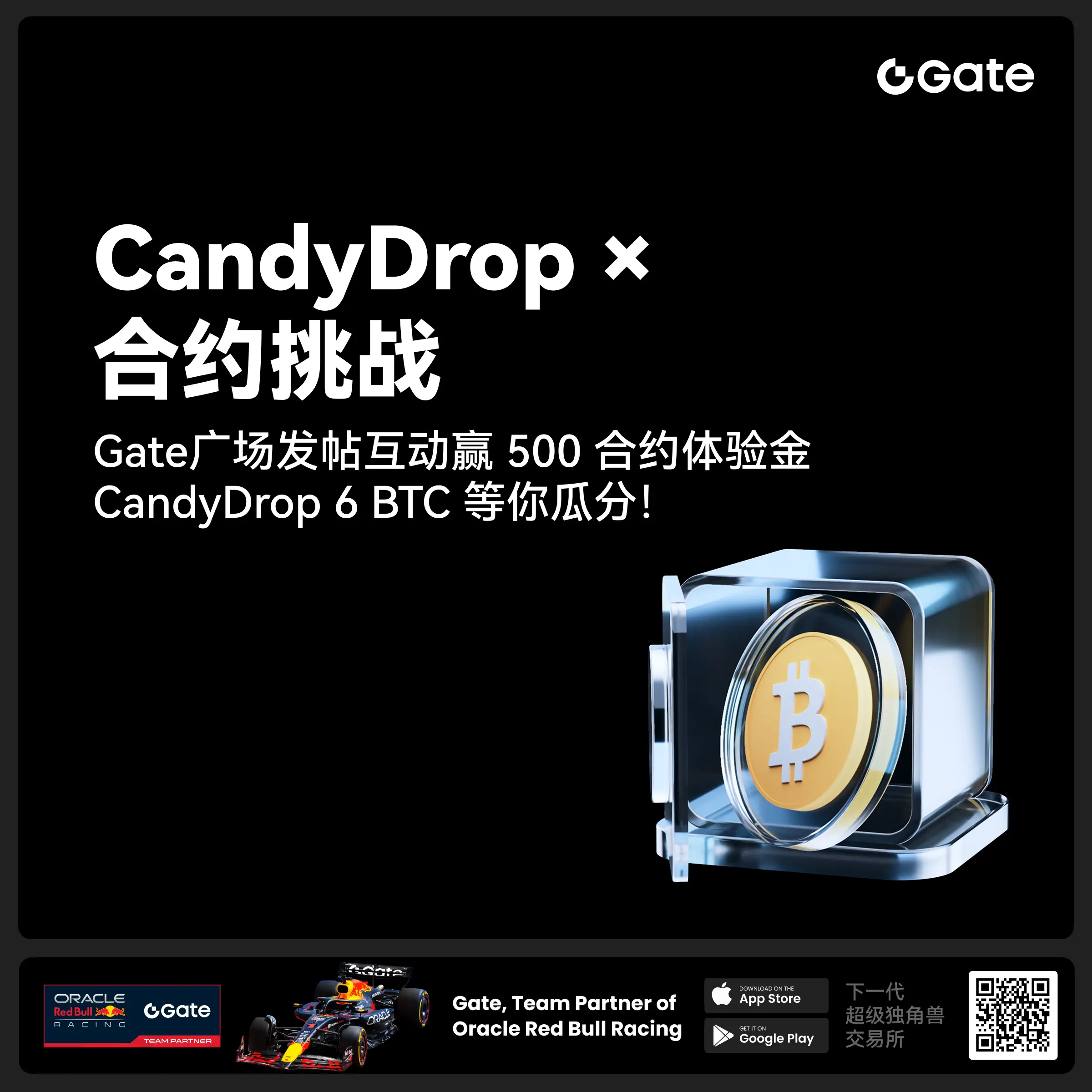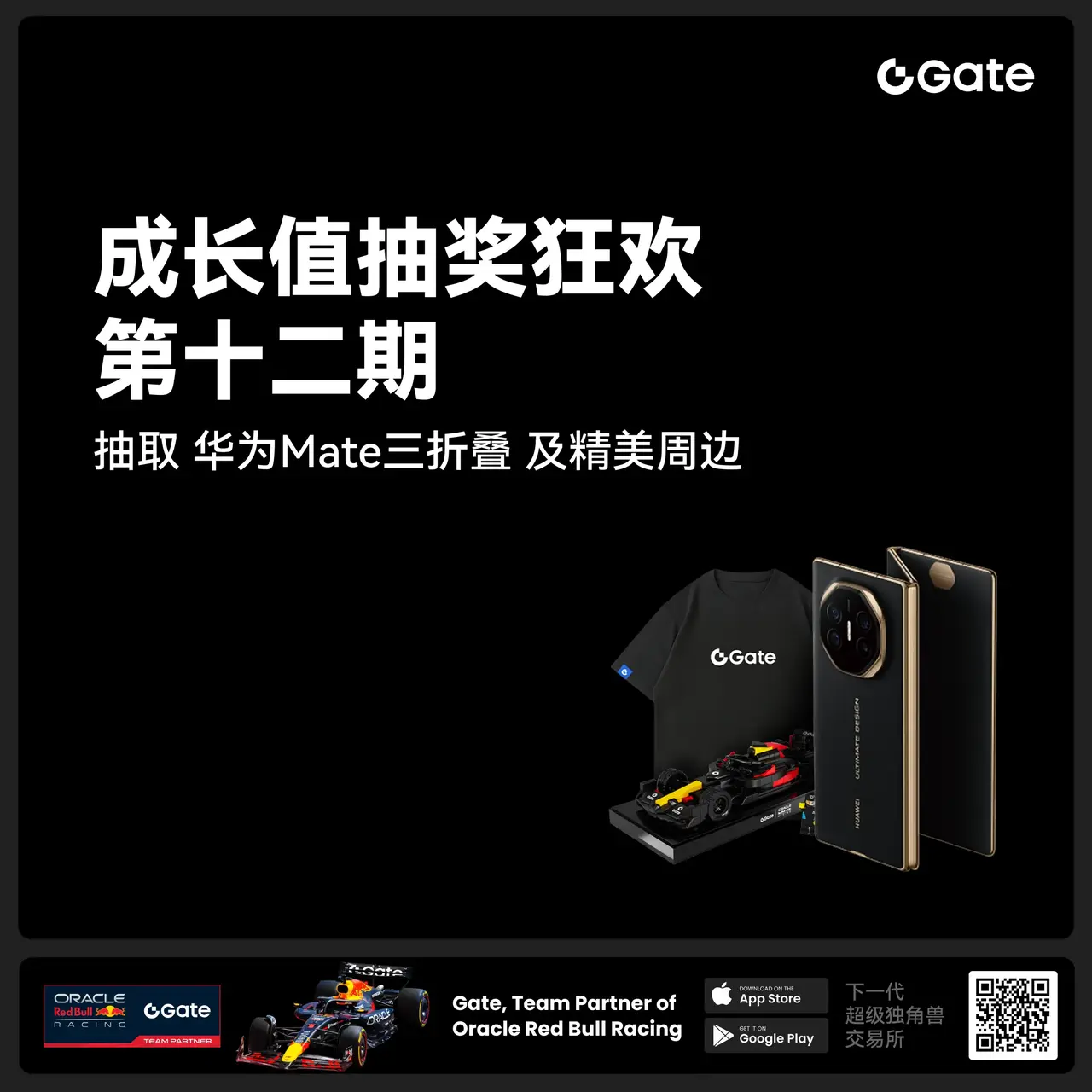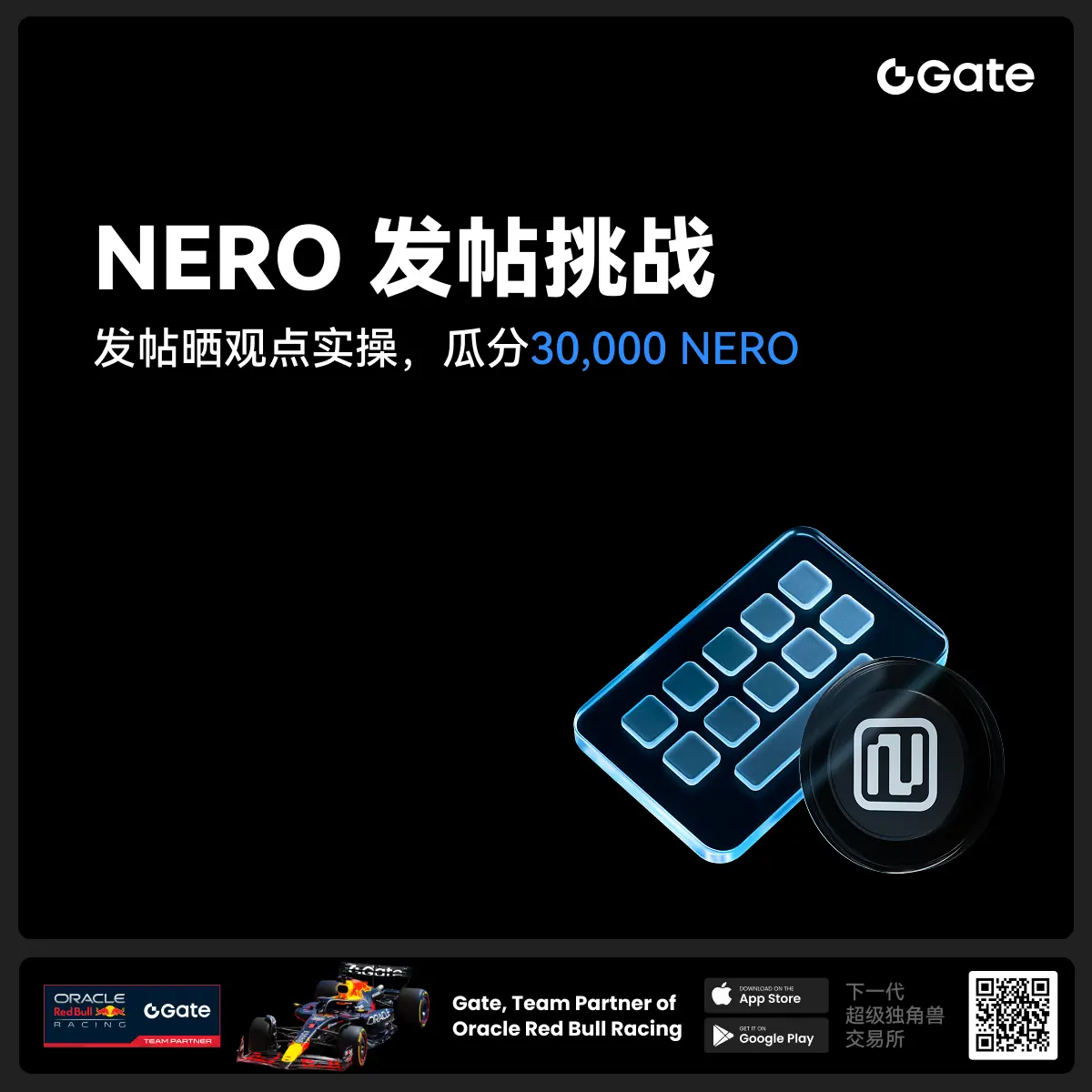- 话题1/3
86191 热度
61047 热度
75268 热度
9834 热度
24412 热度
- 置顶
- 🎉 #CandyDrop合约挑战# 正式开启!参与即可瓜分 6 BTC 豪华奖池!
📢 在 Gate 广场带话题发布你的合约体验
🎁 优质贴文用户瓜分$500 合约体验金券,20位名额等你上榜!
📅 活动时间:2025 年 8 月 1 日 15:00 - 8 月 15 日 19:00 (UTC+8)
👉 活动链接:https://www.gate.com/candy-drop/detail/BTC-98
敢合约,敢盈利
- 🎉 攒成长值,抽华为Mate三折叠!广场第 1️⃣ 2️⃣ 期夏季成长值抽奖大狂欢开启!
总奖池超 $10,000+,华为Mate三折叠手机、F1红牛赛车模型、Gate限量周边、热门代币等你来抽!
立即抽奖 👉 https://www.gate.com/activities/pointprize?now_period=12
如何快速赚成长值?
1️⃣ 进入【广场】,点击头像旁标识进入【社区中心】
2️⃣ 完成发帖、评论、点赞、发言等日常任务,成长值拿不停
100%有奖,抽到赚到,大奖等你抱走,赶紧试试手气!
截止于 8月9日 24:00 (UTC+8)
详情: https://www.gate.com/announcements/article/46384
#成长值抽奖12期开启#
- 📢 Gate广场 #NERO发帖挑战# 秀观点赢大奖活动火热开启!
Gate NERO生态周来袭!发帖秀出NERO项目洞察和活动实用攻略,瓜分30,000NERO!
💰️ 15位优质发帖用户 * 2,000枚NERO每人
如何参与:
1️⃣ 调研NERO项目
对NERO的基本面、社区治理、发展目标、代币经济模型等方面进行研究,分享你对项目的深度研究。
2️⃣ 参与并分享真实体验
参与NERO生态周相关活动,并晒出你的参与截图、收益图或实用教程。可以是收益展示、简明易懂的新手攻略、小窍门,也可以是行情点位分析,内容详实优先。
3️⃣ 鼓励带新互动
如果你的帖子吸引到他人参与活动,或者有好友评论“已参与/已交易”,将大幅提升你的获奖概率!
NERO热门活动(帖文需附以下活动链接):
NERO Chain (NERO) 生态周:Gate 已上线 NERO 现货交易,为回馈平台用户,HODLer Airdrop、Launchpool、CandyDrop、余币宝已上线 NERO,邀您体验。参与攻略见公告:https://www.gate.com/announcements/article/46284
高质量帖子Tips:
教程越详细、图片越直观、互动量越高,获奖几率越大!
市场见解独到、真实参与经历、有带新互动者,评选将优先考虑。
帖子需原创,字数不少于250字,且需获得至少3条有效互动
- 🎉 亲爱的广场小伙伴们,福利不停,精彩不断!目前广场上这些热门发帖赢奖活动火热进行中,发帖越多,奖励越多,快来GET你的专属好礼吧!🚀
1️⃣ #GateLaunchpad上线IKA# |IKA认购体验
在Gate广场带话题晒出你的IKA Launchpad认购体验,4位幸运分享者讲瓜分$200分享奖池!
详情 👉️ https://www.gate.com/post/status/12566958
2️⃣ #ETH冲击4800# |行情分析预测
大胆发帖预测ETH走势,展示你的市场洞察力!10位幸运用户将平分0.1 ETH 奖励!
详情 👉️ https://www.gate.com/post/status/12322403
3️⃣ #创作者活动第二期# |ZKWASM话题
在广场或推特发布与 ZKWASM 或其交易活动相关的原创内容,瓜分4,000枚ZKWASM!
详情 👉️ https://www.gate.com/post/status/12525794
4️⃣ #Gate广场征文活动第二期# |ERA话题
谈谈你对ERA的观点/体验,参与并推广活动,700 ERA大奖等你赢!
详情 👉️ https://www.gate.com/post/status/12361653
5️⃣ #MBG任务挑战# |MBG话题
分享你对MBG的洞察,积极参与和推广MBG活动,20位小
NEOPIN: 链接DeFi与CeFi的监管级加密平台
NEOPIN:韩国游戏巨头的加密之作,探寻DeFi与CeFi的最佳平衡
NEOPIN是一个"许可型DeFi协议",同时具备CeFi和DeFi的优势。它致力于在合规框架内为用户搭建传统金融与DeFi协议之间的桥梁。
NEOPIN入选了阿布扎比投资办公室的创新计划,正与当地政府机构合作开发DeFi监管框架。作为少数已获监管许可的DeFi服务提供商之一,NEOPIN主动拥抱监管以确保长期发展。
作为唯一同时支持Klaytn和Finschia网络的DeFi协议,NEOPIN是Klaytn和Finschia合并事件中的明显受益者,未来可能成为"区块链合并"概念的DeFi范例。
NEOPIN推出基于RWA的DeFi产品,其在合规框架下进军RWA市场有望享受该领域的爆发式增长红利。
通过可比分析估值,我们预计$NPT代币价格在2025年第一季度末将达到3.10至8.39美元,相较当前价格具有较大上涨空间。
依托游戏巨头背景、合规化运营DeFi以及受益于两大公链合并的历史性事件,NEOPIN有望在未来的区块链合并浪潮中赢得更多社区信任。作为一个包容性极强的DeFi协议,NEOPIN引入现实世界资产的努力更容易获得用户认可,有机会赢得广大web2和web3用户的忠诚度。
NEOPIN概况
NEOPIN成立于2021年,自称是"一站式、非托管的许可型协议,用于在监管框架下安全使用加密货币,并同时具备CeFi和DeFi的优势。基于稳定的安全协议和受监管的环境,NEOPIN旨在为用户架起传统金融和DeFi协议的桥梁。"
NEOPIN的母公司是韩国知名游戏公司Neowiz。NEOPIN已入选阿布扎比投资办公室(ADIO)的创新计划,该办公室运营阿拉伯联合酋长国的主权财富基金。NEOPIN正与阿联酋政府合作开发DeFi监管框架,并在全球范围内拓展基于该框架的服务。
NEOPIN团队成员来自币安、三星、Neowiz、Coupang等知名企业。通过领英可见,NEOPIN目前拥有30余名员工,主要来自韩国,在web3初创企业中规模可观。
NEOPIN的突出亮点
Klaytn公链和Finschia公链于2024年2月15日宣布合并,以建成涵盖超过2.5亿亚洲钱包用户的亚洲最大Web3生态系统Project Dragon。
Klaytn是由韩国互联网巨头Kakao的子公司Ground X开发的公链。Kakao Talk是韩国最流行的即时聊天工具。Finschia是由日本互联网巨头Line的子公司Line Tech Plus开发的公链。Line Messenger是日本最流行的即时聊天工具。
韩日两大社交巨头旗下公链的合并,可能成为区块链行业的标志性事件,引发"区块链合并"热潮。
NEOPIN是唯一同时支持Klaytn和Finschia网络的DeFi协议和治理委员会成员。为协助此次历史性合并,NEOPIN已做大量准备工作,如推出Klaytn和Finschia间的首个跨链桥。
作为唯一同时支持两个网络的DeFi协议,NEOPIN的一举一动备受关注,其新功能可能成为DeFi协议应对区块链合并的重要范例。若NEOPIN在此次合并中表现出色,未来更多区块链合并中,它作为首个成功案例也将发挥更大作用。
近年来,随着加密市场膨胀,各国监管机构加大了对web3项目的调查和监管力度。越来越多项目被纳入监管框架已成大势所趋。透明度不足、易受黑客攻击和合规风险等问题限制了DeFi项目的长期发展。
NEOPIN作为最早提出"许可型DeFi"的协议,主动选择拥抱监管,展现了远见卓识。项目早期与监管机构合作,有利于构建既符合监管要求又能充分利用DeFi和CeFi优势的平台。其与阿联酋政府合作开发DeFi监管框架,并在全球推广基于该框架的服务,使自身处于有利竞争地位。
使用NEOPIN服务前,用户需进行KYC验证,这一环节避免了非法资金流入DeFi协议,为用户带来更安全的体验。
2024年3月28日,NEOPIN正式宣布推出基于RWA的DeFi产品,进军RWA市场。
RWA(现实世界资产)市场是链上世界与链下世界结合的重要纽带。近年来,RWA领域的TVL每年实现数倍增长,是高度确定性增长的黄金赛道。
BCG等全球顶级机构均预测RWA市场将在未来数年内发展成为规模达数万亿甚至十余万亿美元的庞大市场。同样合规化从事RWA业务的ONDO Finance,其治理代币$ONDO在过去3个月内增长超过300%。
NEOPIN推出的NEOPIN BDLP是基于RWA的多重收益流动性挖矿协议,用户可充值DAI、USDT或USDC,NEOPIN则利用sDAI和USDe为用户提供丰厚收益(目前年化收益率在13%-30%之间)。
为给每个用户提供最佳资产管理比例,NEOPIN还开发了专有AI算法,帮助用户根据偏好和链上数据决定如何配置不同资产比例,高效投资于复杂DeFi衍生品。
NEOPIN简化了投资流程,使用户可轻松探索和投资各种DeFi,无需跳转多种协议,降低了使用门槛。
$NPT代币经济学
NEOPIN的生态代币$NPT发行总量为10亿枚,目前流通供应量约8,664万枚,流通率低于10%。$NPT的分配比例如下:
$NPT在NEOPIN生态系统中扮演核心角色,连接各种加密金融服务,包括P2E、S2E、M2E和NFT。通过这些服务,用户和流动性提供者可从NPT中受益。
$NPT具体效用如下:
NEOPIN估值分析
通过可比分析估值方法,我们将NEOPIN与DEX、Staking、Bridge和RWA四类项目进行对比。最终结果显示,在2024年末:
结论
NEOPIN的主要亮点包括:
综上所述,NEOPIN作为一个合规化运营的包容性DeFi协议,有望在未来区块链合并浪潮和RWA市场发展中赢得广大用户的信任与忠诚度。